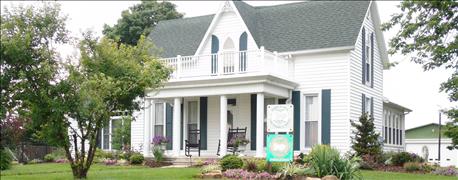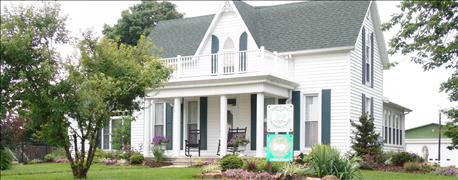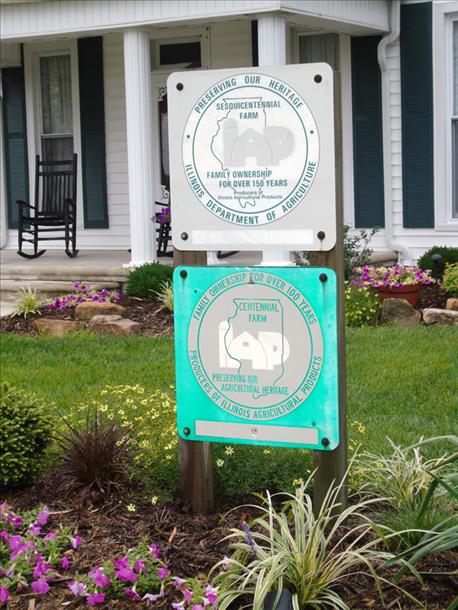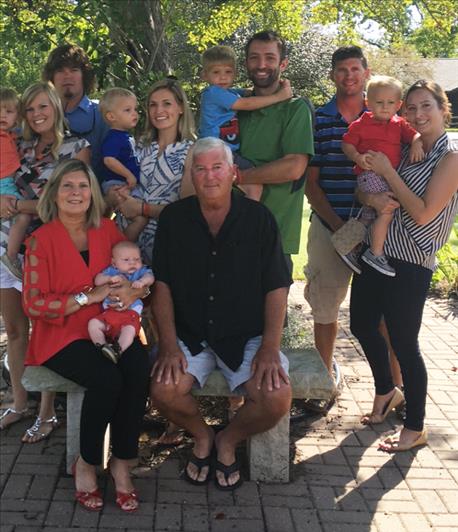
Ask any member of the Walker family and they’ll politely tell you it’s no big deal. They’re just like every other family who’s kept the farm operation going for several generations. The difference? At 230 years old, Walker Farms is the oldest farm on record in Illinois. And the family has handed it down through seven generations.

THE TEST OF TIME: Bob and Jane Walker live in the home built by Orlando Walker in 1889. The family still finds pieces of the past in buildings behind the house, including broken china plates and a brand-new set of windmill blades. Bob and Jane's son Rob says his new home will never hold up as well as the Walker family home.
The farm, located near Palestine, was founded by Thomas Walker in 1786, just a decade after the Declaration of Independence was signed. Family records don’t go back far enough to know where Thomas immigrated from or why he decided to stay in Illinois. The family believes access to the Wabash River and proximity to Terre Haute, Ind., were likely part of the equation.
Today, Bob and Jane Walker live in the home built by Thomas’ son, Orlando, in 1889. Bob farms with his sons Rob and Michael. Daughter Kate is a doctor in Naperville. Rob and his wife, Kelly, have a son, Emerson. Michael and his wife, Kristen, have two sons, Jace and Zayne. Kate and her husband, Jeff Papp, have two sons, Harrison and Will.
They are all very proud of the farm’s history. Jane, a retired teacher, is the “keeper” of as many family details as they can track down. The Walker family does know a little more about Thomas Walker’s son, Orlando. Orlando “put the family’s name on the map” by raising purebred Duroc hogs. They’ve found receipts indicating sales to farmers all over the U.S. An old family photo features Orlando, his wife, and their son and daughter in an old, black horse-drawn buggy, with their Duroc hogs right there, too. The Walkers also have county records indicating a 550-acre land purchase in 1909.

PASSING IT DOWN: Walker Farms is a seventh-generation farm. From founder to current owners, here’s how the farm has moved through the generations: Thomas Walker, Charles Walker, Orlando Walker, Horace Walker, Emerson Walker, Robert (Bob) Walker, and Rob and Michael Walker.
After some thorough research for Rob’s school history project, they discovered a little more about Orlando. Less than 2 miles from the Wabash River, the land on Walker Farms is very sandy and a perfect fit for irrigation. In the 1920s, Orlando, thinking to the future, was quoted speaking on irrigation in the local paper: “It’s coming, but I don’t know if I’ll live to see it.”
In an interesting twist of fate, years later during the 1930s drought, Orlando’s son, Horace, engineered a makeshift irrigation system. Using pipes, a tractor motor and a hose, he pumped water from the Wabash River onto his cornfields. The effort worked, and the crops were saved.
Today, several acres of Walker Farms are irrigated. They raise corn, soybeans and wheat. And every other year, they produce green beans for Razorback Farms, based in Arkansas.
Jane says one thing has definitely changed on the farm: The equipment is a lot bigger, and a lot faster.
And the grandkids love it.

THE WALKER FAMILY: The Walkers include Robert (Bob) and Jane Walker (front), Kristen and Michael Walker (back left), with their sons, Jace and Zayne (Jane’s lap); Kate and Jeff Papp, with their sons, Harrison and Will; and Rob and Kelly Walker with their son, Emerson (right).
Jane talks about her five grandsons who get to play in the same dirt as her children and the generations of Walker children before them. Her grandsons rush to the window anytime they hear a piece of equipment drive up the lane. Farming is a Walker family tradition.
“I can’t imagine it any other way,” she says. “It’s who we are. It’s our way of life.”
And the Walker family has no plans of slowing down. With the next generation of Walkers kicking the dirt and eyeing the big machinery, they recognize the farm may need to expand. To the Walker family, if you don’t look 100 years ahead, you’re selling yourself short.
“We believe if you don’t change, you’ll fall behind,” Rob says. “You have to have an open mind.”
About the Author(s)
You May Also Like




